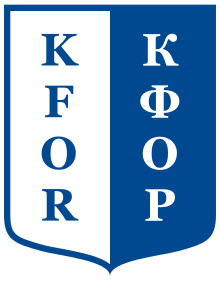
Back قوات كوسوفو Arabic KFOR Azerbaijani KFOR Catalan KFOR Czech KFOR Danish KFOR German Δύναμη Κοσσυφοπεδίου Greek KFOR Esperanto KFOR Spanish Kosovo Force Finnish
| Kosovo Force | |
|---|---|
 | |
| Founded | 11 June 1999 |
| Type | Command |
| Role | NATO peacekeeping |
| Size | 4,302 military personnel[1] |
| Part of | |
| Nickname(s) | "KFOR" |
| Engagements | Yugoslav Wars[2] |
| Website | jfcnaples.nato.int/kfor |
| Commanders | |
| Commander | Major general Enrico Barduani, Italian Army |
| Deputy Commander | Brigade-general Cahit İrican,[3] Turkish Armed Forces |
| Chief of Staff | BG Art Garffer, US Army |
| Command Sergeant Major | Primo luogotenente q.s. Marcello Carlo Pagliara, Italian Army |
| Insignia | |
| Flag |  |
The Kosovo Force (KFOR) is a NATO-led international peacekeeping force and military of Kosovo.[2] KFOR is the third security responder, after the Kosovo Police and the EU Rule of Law (EULEX) mission, respectively, with whom NATO peacekeeping forces work in close coordination.[4] Its operations are gradually reducing until the Kosovo Security Force, established in 2009, becomes self-sufficient.[5]
KFOR entered Kosovo on 12 June 1999,[6] one day after the United Nations Security Council adopted the UNSC Resolution 1244. At the time, Kosovo was facing a grave humanitarian crisis, with military forces from Yugoslavia in action against the Kosovo Liberation Army (KLA) in daily engagements. Nearly one million people had fled Kosovo as refugees by that time, and many permanently did not return.[5]
Currently, 28 states contribute to the KFOR, with a combined strength of approximately 3,800 military personnel.[7]
- ^ "Contributing Nations". jfcnaples.nato.int. NATO (Official website). Archived from the original on 21 February 2020. Retrieved 7 February 2024.
- ^ a b Khakee, Anna; Florquin, Nicolas (1 June 2003). "Kosovo: Difficult Past, Unclear Future" (PDF). Kosovo and the Gun: A Baseline Assessment of Small Arms and Light Weapons in Kosovo. 10. Pristina, United Nations Interim Administration Mission in Kosovo and Geneva, Switzerland: Small Arms Survey: 4–6. JSTOR resrep10739.9. Archived (PDF) from the original on 30 June 2022. Retrieved 3 March 2023.
Kosovo—while still formally part of the so-called State Union of Serbia and Montenegro dominated by Serbia—has, since the war, been a United Nations protectorate under the United Nations Interim Administration Mission in Kosovo (UNMIK). [...] However, members of the Kosovo Serb minority of the territory (circa 6–7 per cent in 2000) have, for the most part, not been able to return to their homes. For security reasons, the remaining Kosovo Serb enclaves are, in part, isolated from the rest of Kosovo and protected by the multinational NATO-led Kosovo Force (KFOR).
- ^ "NATO'nun Kosova'daki Barış Gücü'nün Komutan Yardımcısı Tuğgeneral Cahit İrican oldu". www.aa.com.tr. Retrieved 28 October 2024.
- ^ "KFOR'S STRATEGIC RESERVE FORCE TO REDEPLOY FROM KOSOVO FOLLOWING SUCCESSFUL 45-DAY MISSION". jfcnaples.nato.int. Pristina, Kosovo. 7 December 2024. Retrieved 28 October 2024.
- ^ a b "NATO's role in Kosovo". nato.int. 29 November 2018. Archived from the original on 26 February 2023. Retrieved 6 December 2018.
- ^ "NATO's role in Kosovo". nato.int. Archived from the original on 26 February 2023. Retrieved 12 June 2024.
- ^ "NATO Mission in Kosovo (KFOR)". shape.nato.int. Retrieved 6 February 2024.